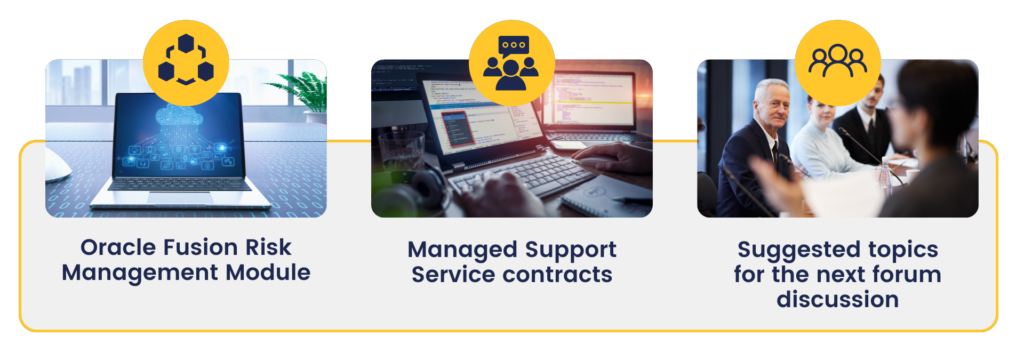Fusion Practices hosted an Oracle ERP Cloud Mastermind Forum aimed at decision-makers from various industries that are interested in or concerned about ERP systems. The forum, hosted both in our London office and online, saw a lot of interactive discussions. We really appreciate the contributions received with insightful knowledge & sharing of experiences.
Key Areas of Focus

Oracle Fusion Risk Management Module
Discussion on ownership of Risk Management GRC (Governance, Risk, and Compliance) Module in Oracle Cloud ERP: Participants expressed concerns about ownership, understanding, implementation, and challenges with Oracle’s GRC which is now called as Oracle Fusion Cloud Risk Management and Compliance. Issues were raised regarding gaining enough buy-in from relevant departments for them to sign off requirements, with particular focus on the role of the internal audit team.
Defining Risk Management Rules: Participants reported challenges in defining audit rules and proposed proactive approaches to rule definition, rather than waiting for external audits to identify concerns. It was observed that concerns raised by external auditors often become the requirements for implementing Oracle Cloud Risk Management toolkit. However it will be better for system integrators to bring their expertise in helping customers foresee audit issues in advance to avoid security related escalations after GoLive.
Role of Finance Department in Risk Management: The discussion was about should the finance department be responsible for giving inputs into the finance transaction controls in Oracle Financial Subledger. Similar ownership applies to HR departments.
Segregation of Duties across Enterprise Applications: The challenge of managing segregation of duties across multiple applications was discussed. The possibility of managing segregation of duties centrally was proposed as opposed to do it individually within Oracle Fusion Cloud Application, aiming to avoid duplicated efforts and maintain consistency. Pros and cons of these options were discussed.
Role of Managed Support Partners when making configuration changes to live systems: Participants raised concerns about their managed support partners making changes to configurations without adequate documentation. It was also suggested to utilize an external configuration snapshot toolkit and or use standard Oracle Cloud ERP functionality to enable audit trails for configuration changes.
Discussion on Payables Transactions and Its Effects: Participants discussed the challenges caused by Payables transactions, using the example an insurance company running all their claims payments through Payables. Both internal audit and external auditors were interested in the controls and wanted to see evidence of such controls and reconciliations
Clear requirements on audit: It was noted that it was challenging to define clear expectations on what the Oracle Cloud product audit rules to be applied and who should own such requirements when those are finance or HR related requirements.
Discussion on Common Pitfalls in Payment Processes: The participants discussed how to identify and address common pitfalls such as duplicate payments or unusual payments. It was agreed that these should be caught by risk modules or identified and addressed through best practice rules.
Managed support services
Discussion on Managed Services: The discussion on managed services revolved around aspects like choosing a partner for managed support, for patch testing was discussed. The need for some investment in internal team was highlighted. The construct of internal team and responsibilities of external support partner were discussed.
Discussion on Patch Releases: Participants discussed the disruption caused by support patches in Oracle products and whether these patches are routine updates. The product stability during quarterly patching were discussed, and need for automation in testing highlighted.
Instances of Patch Issues: Examples were given of instances where patches have broken certain processes, or personalized applications or custom fast formulas in HCM have been affected. Despite the product being stable overall, there was agreement on the need for thorough testing due to a 1% margin where issues may arise.
Proactive management of Quarterly Upgrade Patching: Options for proactively managing the patches were discussed to avoid last minute surprises. Governance process for interaction between IT and departments was also discussed during quarterly upgrades
Discussion on pricing for Managed support model: The competitive landscape of managed support providers was discussed. One of the participants mentioned unhappiness with support provider but they are locked into the contract for multiple years without an exit clause.
SLAs on enhancement requests: Lack of SLAs for enhancements were discussed, with an example being it took an year for some enhancements to be implemented even though business critical because SLAs were in place only for support tickets and not for enhancements.
Support credits: The model of support credits and complexity in identification of tickets versus consultancy effort was discussed, and its financial implication to the client. Ideas were discussed on how to avoid such pitfalls.
Contract Structure: A 1 + 1 year contract structure was suggested, designed to provide flexibility and an easy break clause after one year.
Patch Installation and Feedback: The team confirmed that clients should expect feedback on the results before a patch is installed, along with a report following the installation of quarterly ERP and monthly EPM patching
Challenges in Implementing Changes: Discussion revolved around the challenges in implementing changes, and the importance of careful client selection and a robust client-side team for quality assurance and validation.
Suggested topics for the next forum discussion
Standard versus Customised Processes: The topic of standard versus customized processes was raised, with a suggestion that Oracle should make certain elements, like making tax digital standard and best practices for client until that happens
Client-side team: The nature of resources client must hire in their internal team when working along with SI. Ownership areas in change management and adoption to be discussed.
Interactions with Customer Success Managers The group suggested discussing interactions with customer success managers in the next meeting.
Any other topics: Any other topics could be proposed during the next forum meeting


